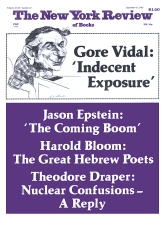In response to:
Message from Heraclitus from the May 13, 1982 issue
To the Editors:
Professor Burnyeat reads Heraclitus as a poet whose aphorisms evoke the paradoxical qualities of the human condition [NYR, May 13]. This view of Heraclitus has him opposing the dependence of conventional philosophy on declarative propositions. It is a view shared by Heidigger and other phenomenologists who wished to penetrate to a new substratum of experience beyond ordinary language, in disregard of that other paradoxical and aphoristic philosopher, Nietzsche, who thought that the surface of things was their reality, and language was needed to recapture that surface.
It is possible to read Heraclitus in a way that does not treat him like a Zen master discombobulating initiates with koans. The aphorisms can be thought of as Kantian antimonies, except that they are not meant to be resolved in a more encompassing formula, but as showing restricted turths about the world, such as that water, which would be a singular thing to Heraclitus, both helps some creatures to survive while killing others. This is neither paradox or relativism, but simply an accurate statement that things in the world have multiple relationships, and that any assertion depends on which of those intertwined relationships is being invoked apart from all the others.
A good case of a Heraclitian aphorism subject to a straightforward reading is, “One must realize that war is shared and conflict is justice….” Georg Simmel, the sociologist most influenced by the phenomenologists, says much the same thing in an axiomatic treatment of the theory of conflict. Although it takes a while to appreciate assertions that are counter to common sense, their truth has the same standing as any other empirically motivated theoretical generalizations. First war is a form of social behavior in which two sides compete for the same goal, and so must articulate their behavior to one another in order to succeed, as is very clear in those “primitive” tribes where the body count is very low before a “winner” is actually understood to have been declared. Second, conflict is justice because justice is allegiance to a view of the outcome of conflict, and is meaningless without it, as we can see in any courtroom, where conventional justice is defined as the outcome of a process of conventionalized conflict. With sufficient imagination, much of Heraclitus yields itself up as home truths, though some epigrams may simply be wrong, or tied to a series of lost meanings for abstract words.
Language, then, separates the parts of the world from one another by focussing on particular meanings, but is not untrue to the world except in that sense. Language is a mundane activity in which we grasp at what we attend to, although in the eye of eternity there is only the overall unity within whose flux we live, and so the eye of eternity has no need for language. This is what I take Heraclitus’ gnostic wisdom to mean: Men go on using language, though in truth the universe, having no distinctions, has none. That does not mean men use language because they have “fallen” or are unwise, but that it is usual for men to talk and not to notice, except out of the corner of their eye, what gods might comprehend.
Why bother saying this? Because it is too easy to “rescue” obscure thought by making it seem a truth beyond reason. And because the mundane world, with all its differentiations, is just as exciting to contemplate as the unity of things.
Martin Wenglingsky
Quinnipiac College, Hamden, Connecticut
M. F Burnyeat replies:
Of course a Heraclitean paradox can be defused, each aphorism made to yield a plain meaning. Not all “home truths” are to be despised, and the urge to find them in Heraclitus has a long, respectable tradition of scholarship behind it. The question is, is that an adequate response to a writer who announces that our whole life is lived in incomprehension?
Imagine someone becoming apprised of the “home truths” recorded in Professor Wenglingsky’s letter: is that what it takes to become for the first time truly awake to the words and works of everyday life? No, the incomprehension of which Heraclitus speaks is pervasive. It is not to be dispelled by any number of “restricted truths”:
Much learning does not teach understanding. For it would have taught Hesiod and Pythagoras, and also Xenophanes and Hecataeus.
To add Georg Simmel to this list of worthies is simply to state that he does not address the radical perplexity that Heraclitus’ paradoxes are designed to induce.
This Issue
September 23, 1982



